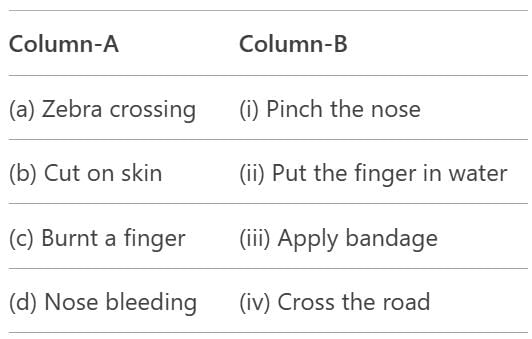Class 5 Exam > Class 5 Tests > Test: Safety And First Aid - 2 - Class 5 MCQ
Test: Safety And First Aid - 2 - Class 5 MCQ
Test Description
10 Questions MCQ Test - Test: Safety And First Aid - 2
Test: Safety And First Aid - 2 for Class 5 2025 is part of Class 5 preparation. The Test: Safety And First Aid - 2 questions and answers have been prepared
according to the Class 5 exam syllabus.The Test: Safety And First Aid - 2 MCQs are made for Class 5 2025 Exam.
Find important definitions, questions, notes, meanings, examples, exercises, MCQs and online tests for Test: Safety And First Aid - 2 below.
Solutions of Test: Safety And First Aid - 2 questions in English are available as part of our course for Class 5 & Test: Safety And First Aid - 2 solutions in
Hindi for Class 5 course.
Download more important topics, notes, lectures and mock test series for Class 5 Exam by signing up for free. Attempt Test: Safety And First Aid - 2 | 10 questions in 20 minutes | Mock test for Class 5 preparation | Free important questions MCQ to study for Class 5 Exam | Download free PDF with solutions
Test: Safety And First Aid - 2 - Question 1
Which of the following is/are cause for fire to spread?
Detailed Solution for Test: Safety And First Aid - 2 - Question 1
Test: Safety And First Aid - 2 - Question 2
A new cook has come to your home. What advice will you give him
Detailed Solution for Test: Safety And First Aid - 2 - Question 2
Test: Safety And First Aid - 2 - Question 3
Shaurya came out after a bath and put on the fan with wet hands what can happen to him?
Detailed Solution for Test: Safety And First Aid - 2 - Question 3
Detailed Solution for Test: Safety And First Aid - 2 - Question 4
Detailed Solution for Test: Safety And First Aid - 2 - Question 5
Detailed Solution for Test: Safety And First Aid - 2 - Question 6
Test: Safety And First Aid - 2 - Question 7
If an stray dog bites your friend, what he should do?
Detailed Solution for Test: Safety And First Aid - 2 - Question 7
Detailed Solution for Test: Safety And First Aid - 2 - Question 8
Detailed Solution for Test: Safety And First Aid - 2 - Question 9
Detailed Solution for Test: Safety And First Aid - 2 - Question 10
Information about Test: Safety And First Aid - 2 Page
In this test you can find the Exam questions for Test: Safety And First Aid - 2 solved & explained in the simplest way possible.
Besides giving Questions and answers for Test: Safety And First Aid - 2, EduRev gives you an ample number of Online tests for practice
Download as PDF















